August 21, 2025 – Meeting with North Korea Experts and Foreign Policy & Security Specialists
Hello. Today is the day Sunim scheduled to meet with North Korea experts and foreign policy & security specialists to discuss peace on the Korean Peninsula.

After completing morning practice and meditation, Sunim headed to the Peace Foundation. He began his day with a breakfast meeting with North Korea experts at 7 AM.
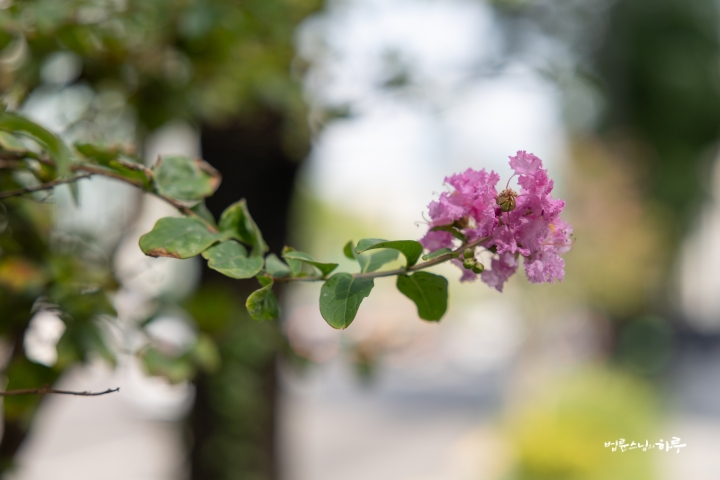
Following a review of price trends in North Korea, they had extensive discussions about the living conditions of North Korean residents and the need for humanitarian aid. The exchange rate had risen from 8,000 North Korean won per dollar to the current 42,000 won, making life extremely difficult for ordinary citizens. Some analysts suggested that the sudden spike in exchange rates, despite no apparent reason, might be due to rumors that North Korea could implement currency reform. While reports indicated that residents’ lives were becoming increasingly difficult, some observations suggested that the national economy appears stable based on trade transaction data.
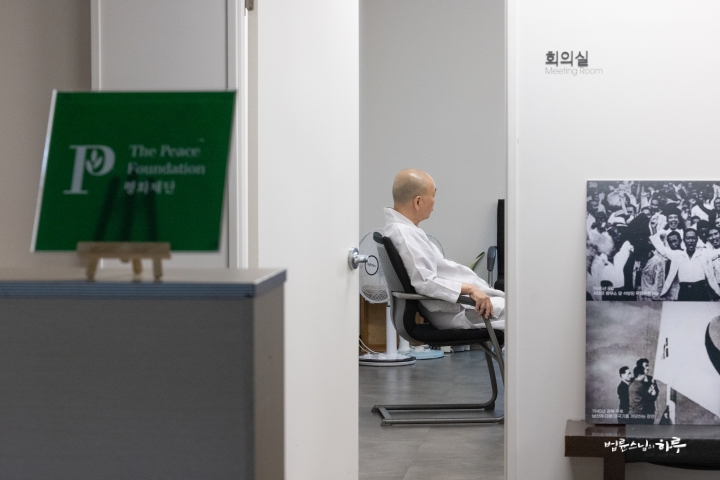
At 10 AM, Sunim met with foreign policy and security experts. In-depth discussions continued on how to resolve US-North Korea relations as a solution for peace on the Korean Peninsula, and how the Korean government should approach the upcoming Korea-US summit. After two hours of discussion, they scheduled their next meeting and concluded.
After lunch, at 2 PM, people who had worked together on North Korean refugee support projects since the mid-1990s visited Sunim for the first time in 27 years. Pastor Kim Jae-oh and his group, who had led the “Unification Corn Meeting” at that time, embraced Sunim warmly upon seeing him.
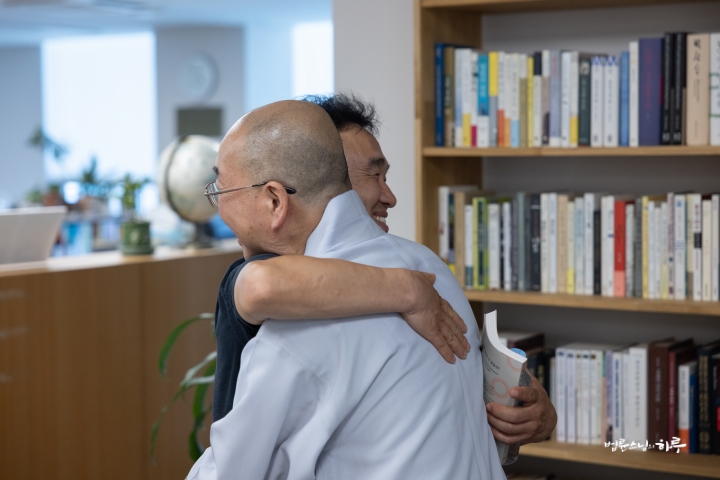
Two hours passed quickly as they shared stories about helping North Korean refugees in the past and caught up on recent news. They took a commemorative photo together before ending the meeting.
At 4 PM, Jung Sung-hun, Chairman of the DMZ Peace and Life Park, visited for a meeting. They began their conversation by discussing how much the ginseng seedlings he had shared last spring had grown after being planted at the Dubuk Retreat Center farm. Chairman Jung requested that more be planted, explaining that “while trees take a long time to grow, ginseng is an annual plant that grows quickly and has active photosynthesis, making it effective in reducing greenhouse gases.”
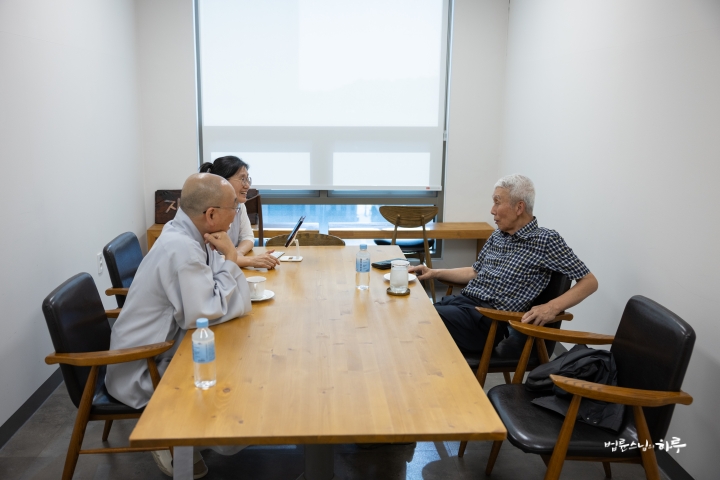
At 5:30 PM, Sunim had dinner with JTS volunteers who would be dispatched to Bhutan at the end of August. After the meal, the JTS volunteers offered three prostrations to Sunim.
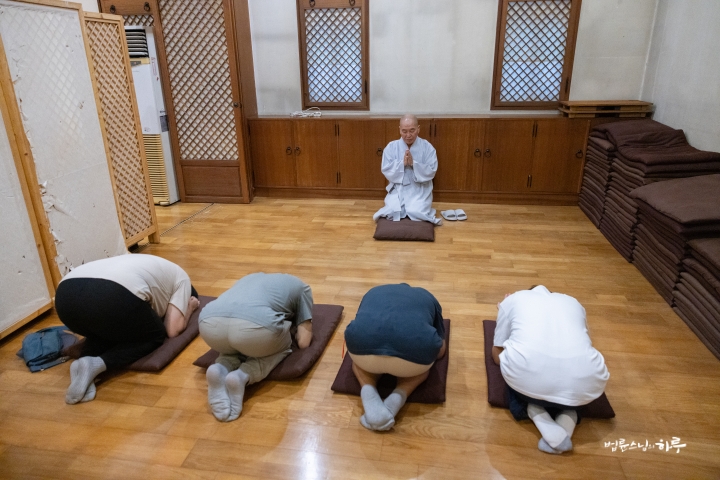
“When we arrive in Bhutan, we’ll start in earnest with sample house construction and site surveys from September.”
“Good. Whatever difficulties arise, you need to communicate with each other while working. Don’t just grit your teeth and bear it alone.”
“Yes, we won’t just suffer in silence.” (laughter)
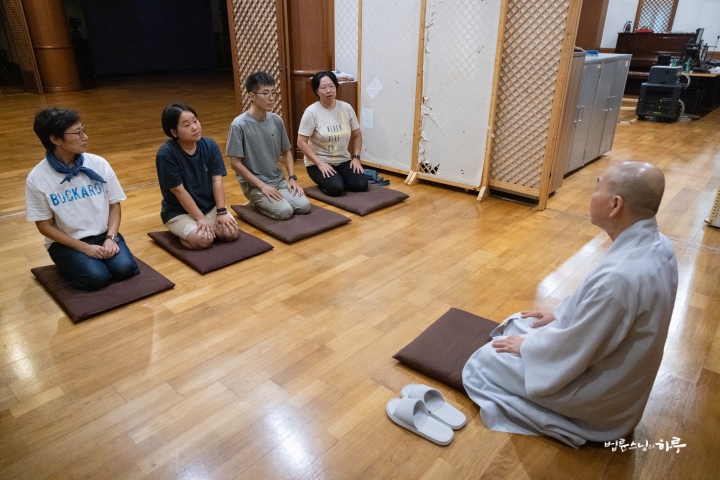
Sunim concluded the gathering with a bright smile.
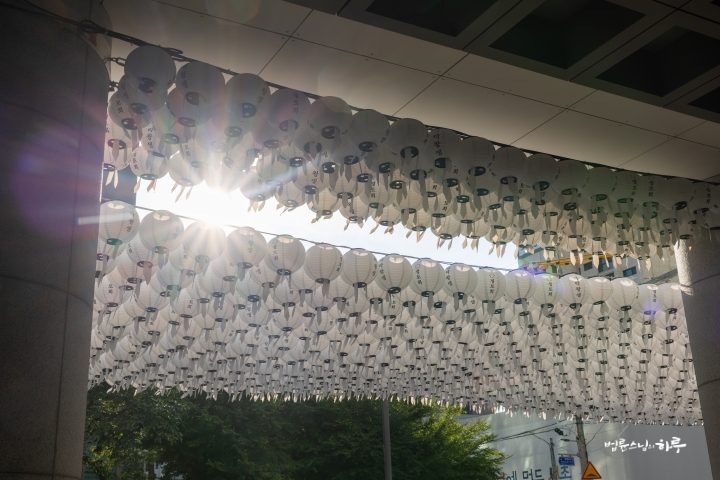
Tomorrow, after meeting with social figures outside, there will be an Dharma Q&A with English interpretation for foreigners living in Korea at the Jungto Social and Cultural Center in the evening.
Since there was no Dharma talk today, I’ll conclude by sharing the conversation Sunim had with military personnel during his invited lecture at the Pohang Naval Aviation Command on the 12th.
Living with My Mother-in-Law for 7 Years, I’ve Reached My Limit
“Then live separately. Talk with your husband first. Marriage is about two people living together. Children come in the process. Parents are people to be grateful to for giving birth to and raising us, but once you’re over twenty, independence is nature’s principle. Even animals in nature leave their parents when they become adults. Living separately is the principle, not living together – that’s what’s natural. Of course, you might live together for convenience depending on circumstances, but that’s an exceptional case.
For married couples, living together is the principle. There are cases where they live apart due to work, but marriage is originally about wanting to live together. Living separately from parents is the principle, and living together happens for benefits like childcare or housework. So if living together causes more harm than good, just live separately. Why can’t you live separately?”
“My mother-in-law sold her previous house, so she has nowhere to go.”
“Then save money and pay her rent.”
“That’s right. But my husband has a very strong desire to take care of his mother.”
“Then just say, ‘You two go live together.'”
“I want to say that too.”
“Then say it. Tell your husband this:
‘You married me to live with me, not to live with your mother. If you wanted to live with your mother, you shouldn’t have gotten married. Decide whether you want to live with your mother or with me.’
Why is an adult with three children struggling with this issue? From what you’re saying, the reason you came to live with your mother-in-law is because both of you work and it was hard to raise three children, so it was convenient to have her take care of the children and clean. Do these benefits come for free? If there are benefits, you have to pay a price.”
“That’s right.”
“You want to enjoy only the benefits without paying any price. When parents come to their son’s house to take care of grandchildren, would they just receive a salary like a nanny? If she were a paid nanny, she wouldn’t interfere with household matters and would only take care of the baby. But do you pay your mother-in-law a salary?”
“We took her in on the condition that we pay off her debts, so we don’t give her money separately.”
“From your mother-in-law’s perspective, she probably thinks that’s what children should naturally do. Since you didn’t pay her a salary, she thinks she raised all the children by herself. That’s why she nags. Which is better for you – listening to your mother-in-law’s nagging a little, or taking care of three children alone? Isn’t it harder to raise three children alone just to avoid nagging?
So you should always think toward your mother-in-law, ‘Thank you for taking care of the children and cleaning.’ Then nagging won’t be a big problem. You’re struggling because you don’t know how to be grateful.”
“I’ve gained some insight. Thank you.”
“In life, nothing is free, whether between spouses or between parents and children. When someone does something for free, it becomes a debt you’ll have to repay. For example, if your salary is 1 million won but you borrow and spend 2 million won every month, it might feel good at the moment. But after a year, you’ll have to repay 24 million won. There’s always a price. When your mother-in-law takes care of the children, it’s natural that she nags in return. You nag your children too – ‘Why do you wake up late?’, ‘Why don’t you study?’ Just like that, it’s natural for your mother-in-law to nag, ‘Why do you prepare side dishes this way?’, ‘Why do you scold the children?’ When that happens, you just need to say two things: ‘I’m sorry’ and ‘Thank you.'”
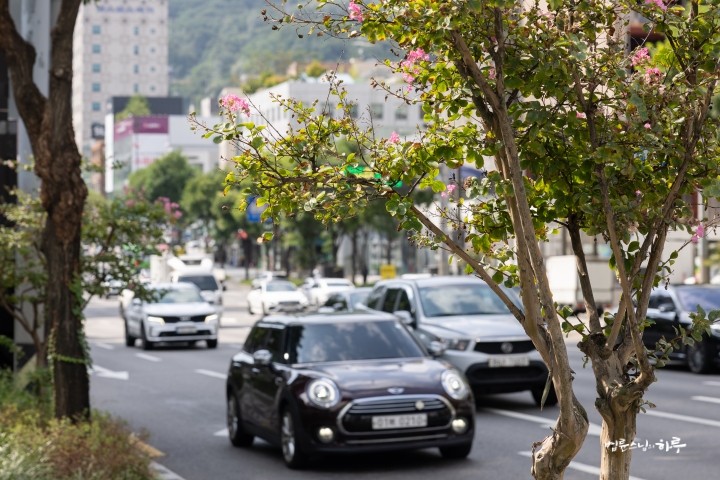
“There are two phrases needed when living with elders. First, ‘Thank you.’ ‘Thank you for raising your son well and giving him to me,’ ‘Thank you for taking care of the children.’ You need to have this grateful heart. Second, ‘I’m sorry.’ Wouldn’t you feel a bit sad if you raised a child and then some young woman took him away? In that sense, you should say, ‘Mother, I’m sorry for taking your son.’ If your mother-in-law is a bit prickly, say ‘I’m sorry’ first, and usually say ‘Thank you’ often. After treating her this way a few times, the children will gradually become more comfortable living with their grandmother, and your husband’s heart will be at ease too. But if you really can’t stand it, you’ll have no choice but to send your mother-in-law and husband away.”
“Thank you.”
“Don’t just look at the annoying aspects, look at what you’re grateful for.”





